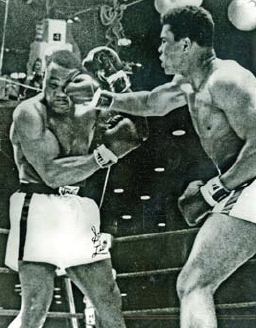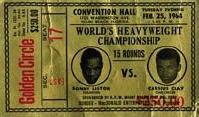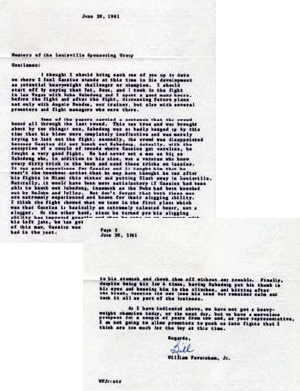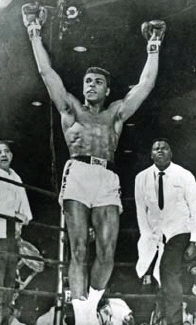Browsing in Our Archive: Muhammad Ali and the Louisville Sponsoring Group
By Noah Huffman
Special Collections Assistant
About |
 Honored by Sports Illustrated as “the Sportsman of the Century” and once named by Time Magazine the “most recognizable person on Earth,” Muhammad Ali is unquestionably Louisville’s most celebrated citizen of the 20th century.
Honored by Sports Illustrated as “the Sportsman of the Century” and once named by Time Magazine the “most recognizable person on Earth,” Muhammad Ali is unquestionably Louisville’s most celebrated citizen of the 20th century.
His legacy was confirmed last November with the grand opening of the Muhammad Ali Center in downtown Louisville.
Before his meteoric rise to the heavyweight title and his controversial forays into politics, Ali’s early boxing career was guided by a syndicate of 11 prominent Louisville businessmen known as The Louisville Sponsoring Group. Arranged by black attorney Alberta Jones, the group included attorneys and executives from companies such as Brown-Foreman Distillers Corp., Brown-Williamson Tobacco, and the Courier-Journal and Louisville Times.1 From 1960 to 1966, the Louisville Sponsoring Group arranged Ali’s fights, hired trainer Angelo Dundee, provided legal services, managed his finances, and paid his expenses. In exchange, the group retained half of Ali’s earnings.2
The Filson’s growing 20th century collections include records of the Louisville Sponsoring Group in the George Barry Bingham papers. While most letters concern financial and legal matters, some highlight Ali’s development as a boxer. In the following letter written to the members of the Louisville Sponsoring Group nearly three years before Ali defeated Sonny Liston for his first heavyweight title in February 1964, manager Bill Faversham assesses the fighter’s progress.
 30 June 1961
30 June 1961
Members of the Louisville Sponsoring Group
Gentlemen:
I thought I should bring each one of you up to date on where I feel Cassius3 stands at this time in his development as potential heavyweight challenger or champion. I should start off by saying that Pat, Ross, and I took in the fight in Las Vegas with Duke Sabedong and I spent a good many hours, before the fight and after the fight, discussing future plans not only with Angelo Dundee, our trainer, but also with several promoters and fight managers who were there.
. . . with the exception of a couple of rounds where Cassius got careless, he fought a very good fight. . . . It was good experience for Cassius and it taught him
that he wasn’t the knockout artist that they may have thought he was after his fights in Miami this winter and putting Clark away in Louisville. . . . I think the fight showed what we knew in the first place which was that Cassius is basically an extremely talented boxer, not a slugger.4
 . . . You will remember
that when we formed the Group
we thought that Cassius might
become a top challenger for the
heavyweight championship in 4
years. I do agree that he is ahead
of this schedule and that he may
become a top challenger within 2
years. He has made fine progress
but he still has only had 7 professional
fights, he still makes amateur
mistakes, he is still only 19
years old and makes mistakes of
youth, he still needs to get a lot of
fights under his belt before he can
take on the toughest men in the
heavyweight division.
. . . You will remember
that when we formed the Group
we thought that Cassius might
become a top challenger for the
heavyweight championship in 4
years. I do agree that he is ahead
of this schedule and that he may
become a top challenger within 2
years. He has made fine progress
but he still has only had 7 professional
fights, he still makes amateur
mistakes, he is still only 19
years old and makes mistakes of
youth, he still needs to get a lot of
fights under his belt before he can
take on the toughest men in the
heavyweight division.
. . . You have probably read in the paper that Cassius is going to fight Alonzo Johnson. . . . This will be another step forward as Johnson is the best fighter Clay has met. I think Cassius will win but, more important, I think he will gain another sort of experience.5 In other words, we must remember to build this boy slowly and not rush him.
. . . As I have indicated above, we have not got a heavyweight champion today, or the next day, but we have a marvelous prospect for a couple of years from now and, as your representative, I am not going to allow promoters to push us into fights that I think are too much for the boy at this time.
Regards,
William Faversham, Jr.
 1. The 11 members of the
Louisville Sponsoring Group
included: Robert Worth
Bingham, W.L. Lyons Brown,
Sr., Patrick Calhoun, Jr., J.D.
Stetson Coleman, Gordon B.
Davidson, William Faversham, Jr, Archibald McG. Foster, George
W. Norton, IV, Vertner D. Smith, Sr., Elbert
Gary Sutcliffe, and James Ross Todd.
1. The 11 members of the
Louisville Sponsoring Group
included: Robert Worth
Bingham, W.L. Lyons Brown,
Sr., Patrick Calhoun, Jr., J.D.
Stetson Coleman, Gordon B.
Davidson, William Faversham, Jr, Archibald McG. Foster, George
W. Norton, IV, Vertner D. Smith, Sr., Elbert
Gary Sutcliffe, and James Ross Todd.
2. The Sponsoring Group later renegotiated their contract with Ali to retain only 40 percent of his earnings.
3. On March 6, 1964, Cassius Marcellus Clay, Jr. officially changed his name to Muhammad Ali at the request of Elijah Muhammad, then leader of the Nation of Islam.
4. Ali defeated Duke Sabedong by decision in 10 rounds in Las Vegas on June 26, 1961.
5. Less than a month after defeating Sabedong, Ali won a 10 round decision against Alonzo Johnson in Louisville on July 21, 1961.
The Filson Historical Society
1310 South Third Street - Louisville, KY 40208
Phone: (502) 635-5083 Fax: (502) 635-5086
Hours
The Ferguson Mansion and Office
Monday - Friday: 9 am. - 5 pm.
Saturday and Sunday closed
Library
Monday - Friday: 9 am. - 5 pm.
Saturday: 9 am. - 12 noon
